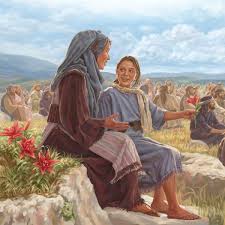When Jesus Had Finished Saying These Things,
the Crowds Were Amazed at His Teaching
Matthew 7:28 to 8:1
The response to this most magnificent sermon ever given was mixed. It wasn’t like everyone there that day believed that Yeshua was the Meshiach ben David. No way Moshe! It seems certain that some of those in the large crowd believed in Him, but, the number who entered the narrow gate proved what He said: and only a few find it (Matthew 7:14).

But, any conversions that may have taken place are not recorded. We are only told that when Jesus had finished saying these things, the crowds were amazed at His teaching (7:28). They were totally blown away by the power of what Jesus said. Without a doubt much of this was because of the spiritual focus and content of His message. They had never heard such broad, discerning words of wisdom, depth, insight and perceptiveness. The crowd had never heard such straightforward and fearless denunciation of the Pharisees and Torah-teachers. Israelites had never heard such a powerful description of true righteousness or such a relentless description and condemnation of self-righteousness. There were certainly some new truths and applications revealed by the Rabbi from Galilee. However, the most remarkable thing that amazed the crowd that day was the way He taught.
Every rabbi taught on the basis of previous rabbinic authority. When teaching, a rabbi would always quote previous rabbis, saying things like, “This is what rabbi Cohen says,” or “This is what rabbi Kasdan says.” But, in contrast to this, Yeshua didn’t quote one other rabbinic source because He taught as one who had authority, and not as their Torah-teachers (7:29 CJB). It was obvious that the Lord did not need any extra authority because He had the ultimate Authority. As the boy Jesus was growing up, each and every morning, God the Father would awaken God the Son, take Him aside and begin to teach and train Him in preparation for His future ministry (to see link click Ay – And the Child Grew and Became Strong, He was Filled with Wisdom and the Grace of God was Upon Him). The line between Himself and the Pharisees had been clearly drawn, and everybody knew it.
In this sense, Yeshua was actually fulfilling one of the anticipated ministries of the Mashiach. The Holy One, blessed be He, will sit and expound the new Torah that He will give through the Messiah. “New Torah” means the secrets and the mysteries of the Torah that have remained hidden until now. It does not refer to another Torah, heaven forbid, for surely the Torah which He gave us through Moses our Master, peace by upon Him, is the eternal Torah; but the revelation of her hidden secrets is called “new Torah” (Midrash Talpiyot 58a). What a fitting end to Christ’s dynamic teaching! The Messiah has come to reveal the deep meaning of the Torah. May we be wise and build on that rock even today.607
The large crowd that followed Jesus when He came down from the mountainside (Mt 8:1) did not do so because they followed Him as their Meshiach. Most of them, no doubt, were merely curious, never before having seen anyone speak with such authority (Mt 4:23-25 and 7:28-29). They were uncommitted observers, amazed by what the Nazarene had said but not convicted enough to follow Him as their Lord and Savior.
As a unit, the Sermon on the Mount is Christ’s interpretation of righteousness in contrast to the Pharisaic interpretation of the righteousness of the Torah. But more than that, it was Jesus’ public rejection of pharisaic Judaism as embodied in the Oral Law (see Ei – The Oral Law). Therefore, this will lead to the Sanhedrin’s (see Lg – The Great Sanhedrin) rejection of His messianic claims and His ultimate crucifixion.



Leave A Comment